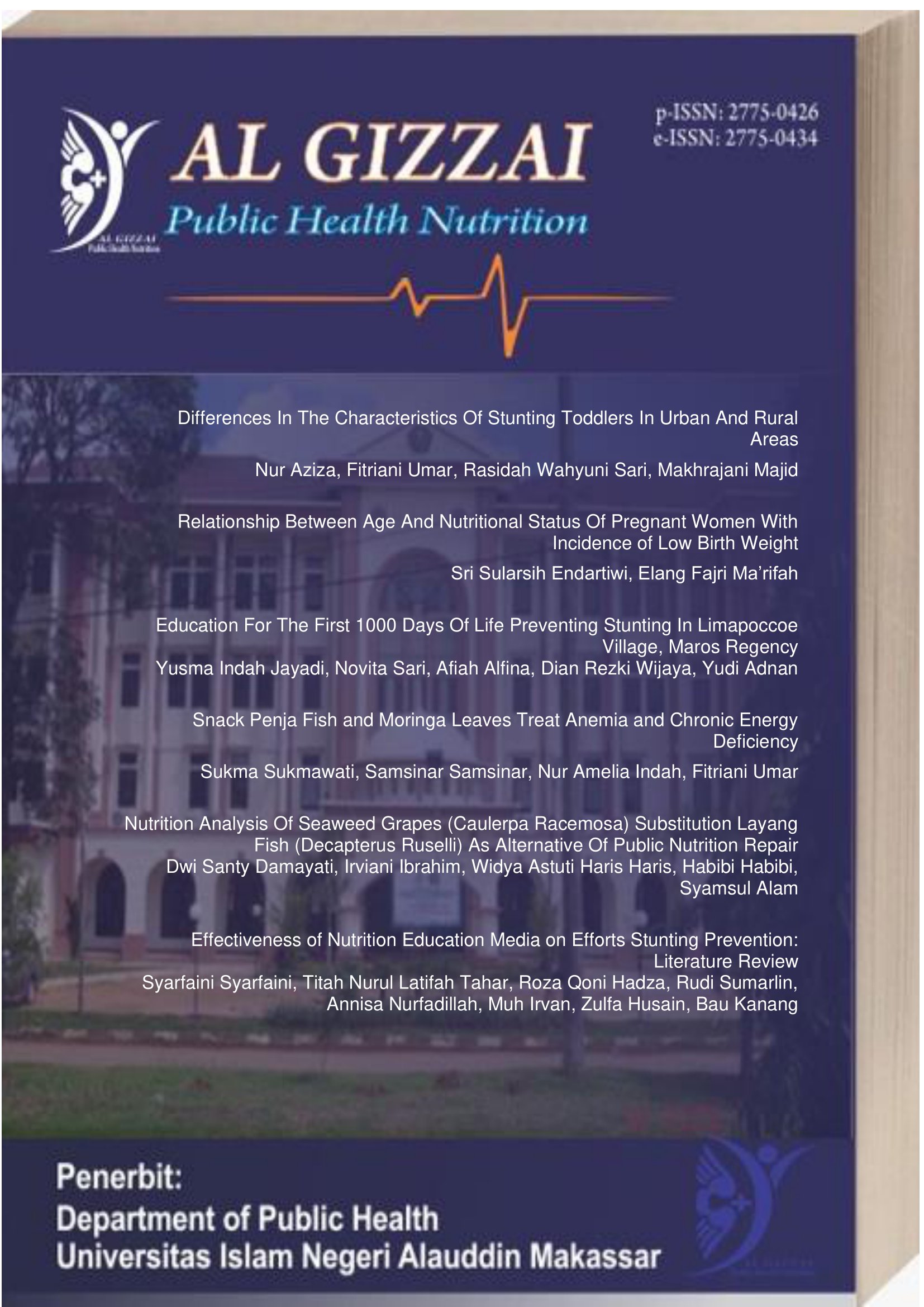Education For The First 1000 Days Of Life Preventing Stunting In Limapoccoe Village, Maros Regency
Abstract
As Based on WHO limits, Indonesia is in the category of high stunting problems. So that fulfilment of nutritional intake at 1000 Day First, the child's life is very important. If in that age range the child gets optimal nutritional intake, the decline in the child's nutritional status can be prevented from the start. This research uses quantitative research with purposive sampling technique. This study uses quasi-experimental designs with a one-group pretest-posttest.The research population is all WUS, IRT, and pregnant women who live in Samata and Kampala Hamlets, Limapoccoe Village, totaling 242 residents who are female. Respondents in this study amounted to 30 respondents. The variables seen in this study are Knowledge and Attitudes Regarding the First 1000 Days of Life. This research was conducted in December 2021. Data processing was carried out in a descriptive-analytic manner with the Wilcoxon test. The results of the research conducted on the level of community knowledge in the Samata hamlet regarding the importance of the First 1000 Days of Life there was a significant difference (p-value 0.00) in the knowledge of the community before and after the counseling was carried out, while the attitude of the community when participating in the counseling the results obtained by the residents of the Samata hamlet did not have a difference. before and after the activity (p-value 1.00). It is necessary to have an integrated counseling program carried out by the puskesmas or posyandu cadres so that there is an increase in knowledge and attitudes of 1000 DoL which can prevent stunting in generations.
References
Agritubella, SM, & Delvira, W. (2020). The effectiveness of the poster of the diet pattern for the first 1000 days of life (HPK) on the knowledge of pregnant women about nutrition in preventing stunting at the Rambah Health Center, Rokan Hulu Regency. Journal of Endurance: Scientific Study of Health Problems, 5(1), 168-179.avaible at: https://doi.org/10.22216/jen.v5i1.5027
Al-Rahmad, AH. (2019). The Effect of Counseling on the First 1000 Days of Life (HPK) on Couples of Childbearing Age in Urban and Rural Areas. Journal of Health, 10(1), 147-152.avaible at: https://doi.org/10.26630/jk.v10i1.1217
Amdadi, ZA, Sabur, F., & Afriani, A. (2021). Education about the first 1000 days of life on knowledge of pregnant women in the working area of the Tamalate Public Health Center Makassar. Health Media Makassar Health Polytechnic, 16(1), 29-36.avaible at: http://dx.doi.org/10.32382/medkes.v16i1.1835
Bappenas. 2012. SUN Movement: The National Movement for the First 1,000 Days of Life
Dhirah, UH, Rosdiana, E., Anwar, C., & Marniati, M. (2020). Relationship of Mother's Behavior About the First 1000 Days of Life with Nutritional Status of Baduta in Mibo Village, Banda Raya District, Banda Aceh. Journal Of Healthcare Technology And Medicine, 6(1), 549-561.avaible at: https://jurnal.uui.ac.id/index.php/JHTM/article/download/872/442
Hidayah, N., & Marwan, M. (2020). Community Empowerment Efforts in Creating Nutrition Aware Millennials Who Are Stunting Free Through 1000 DoL Activities. Journal of Community Engagement in Health, 3(1), 86-93.avaible at:https://doi.org/10.30994/jceh.v3i1.41
Kurniatin, LF, Putri, PRC, & Pramuwidya, A. (2021). Counseling on the first 1000 days of life in the effort to prevent stunting in the work area of the Saigon Health Center and Siatan Hulu Health Center in 2021. Proceedings for Community Service Poltekkes, Ministry of Health, Tasikmalaya, 1(2).
Ley D, et all. (2017). Early-life origin of intestinal inflammatory disorders.Nutr. Rev.2017;75: 175–87.avaible at: https://doi.org/10.1093/nutrit/nuw061
Ministry of Health Data and Information Center. 2020. The Stunting Situation in Indonesia. ISSN:2088-207
Ministry of Health, RI. 2014. Guidelines for balanced nutrition, Jakarta.
Nugrawati, N. (2021). Education on the Utilization of Moringa Leaves for Stunting Prevention in Posyandu Cadres in Maros Baru District, Maros Regency. JTCSA AdpertisJonline, 2(1), 6-10.avaible at: https://jurnal.adpertisi.or.id/index.php/JTCSA/article/view/184
Parisudha, A. (2020). Increased Knowledge of 1,000 HPK to Prevent Stunting Risk in North Banguntapan Aisyiyah Cadre. Journal of Global Health, 3(2), 62-68.avaible at: http://dx.doi.org/10.33085/jkg.v3i2.4630
Simanjuntak, B. Y., Haya, M., Suryani, D., Khomsan, A., & Ahmad, C. A. (2019). Maternal knowledge, attitude, and practices about traditional food feeding with stunting and wasting of toddlers in farmer families. Kesmas, 14(2), 58–64.avaible at: https://journal.fkm.ui.ac.id/kesmas/article/view/2712https://journal.fkm.ui.ac.id/kesmas/article/view/2712
Tong, B. C.-K., & Benjamin Chun-Kit Tong. (2018). Preventing the Onset of Child Sexual Abuse by Targeting Young Adolescents With Universal Prevention Programming. Physiology & Behavior, 176(5), 139–148.
Zubaeda, Z., Suhartono, S., & Runjati, R. (2020). Effects of The First 1000 Days of Life Module For Premarital Women Against Knowledge and Attitudes to Prevent Stunting. STRADA Scientific Journal of Health, 9(2), 515-522.avaible at: https://doi.org/10.30994/sjik.v9i2.332
Priyatna, A., & Sos, S. (2014). The First 1000 Days of Life. Elex Media Komputindo
Suhardjo. (2003). Various ways of nutrition education. Jakarta: Bumi Aksara.
Rahayu, A., Rahman, F., Marlinae, L., Husaini, H., Meitria, M., & Yulidasari, F. (2018). Textbook of Nutrition for the First 1000 Days of Life. Yogyakarta: CV Mine.avaible at: https://kesmas.ulm.ac.id/id/wp-content/uploads/2019/02/BUKU-AJAR-1000-HARI-PERTAMA-KEHIDUPAN.pdf
Copyright (c) 2024 Yusma Indah Jayadi, Novita Sari, Afiah Alfina, Dian Rezki Wijaya, Yudi Adnan

This work is licensed under a Creative Commons Attribution-NonCommercial-ShareAlike 4.0 International License.
Authors retain copyright and grant the journal right of first publication with the work simultaneously licensed under a Creative Commons Attribution-NonCommercial-ShareAlike 4.0 International License that allows others to share the work with an acknowledgment of the work's authorship and initial publication in this journal.
Authors are able to enter into separate, additional contractual arrangements for the non-exclusive distribution of the journal's published version of the work (e.g., post it to an institutional repository or publish it in a book), with an acknowledgement of its initial publication in this journal.
Authors are permitted to publish their work online in third parties as it can lead to wider dissemination of the work.











